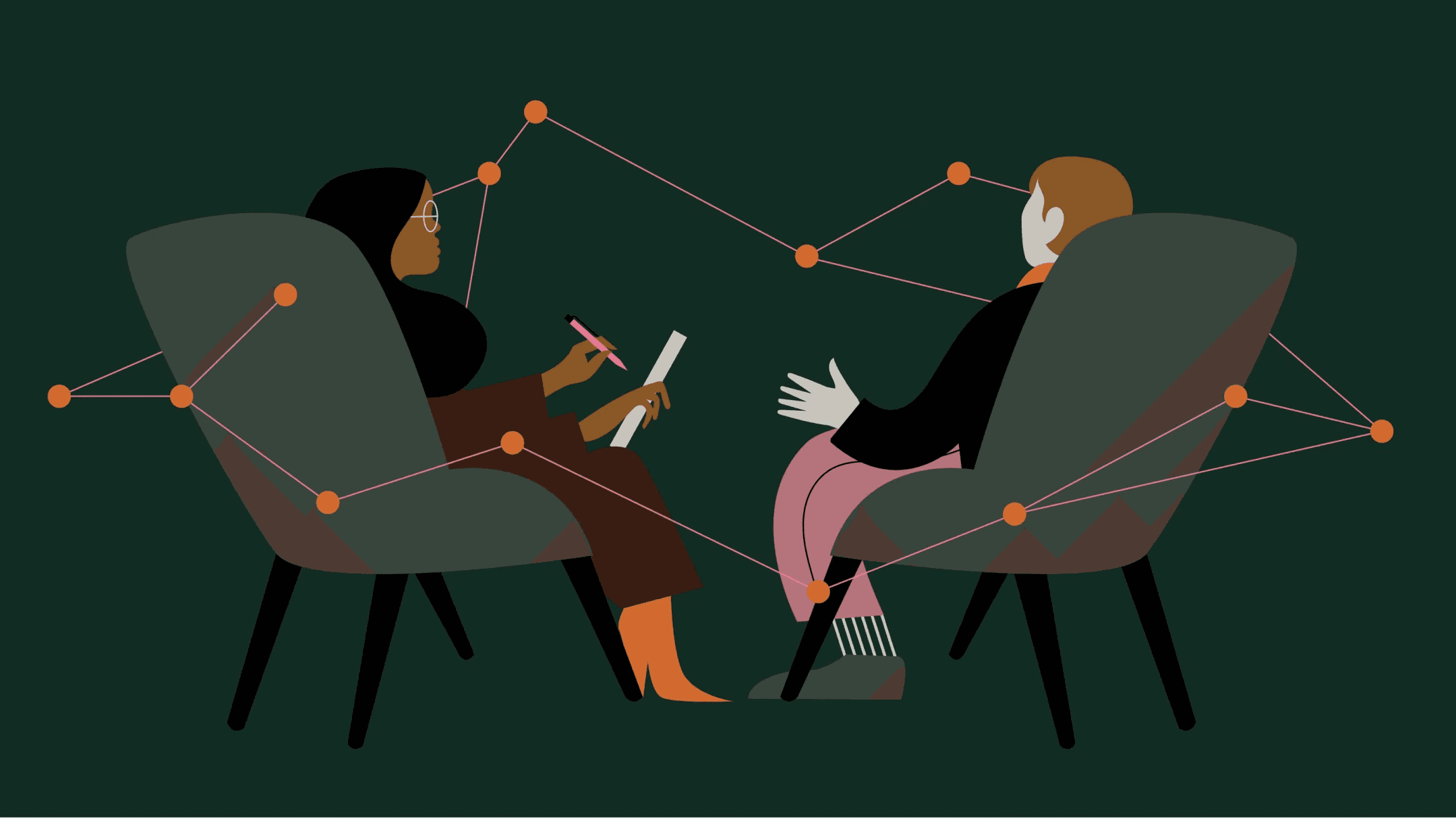Continuous Client Support: How AI is Filling the Gaps in Therapy
Sep 10th, 2024
Addy Bhatia
I. Introduction

Imagine a world where every client has access to 24/7 emotional support—a world where anxiety doesn’t have to wait until the next therapy session. With over 40 million adults suffering from anxiety disorders in the U.S., the demand for accessible mental health resources has never been greater. Consider John, a young professional struggling with overwhelming stress. Between his bi-weekly sessions with his therapist, he feels lost and unsupported. However, after discovering an AI-driven mental health app that provides him with real-time feedback and coping mechanisms, he begins to feel more in control of his emotions.
This article focuses on how AI is revolutionizing client support, ensuring that help is always available when clients need it most. As mental health providers, it’s vital to recognize the importance of integrating technology into our practices. A report from the BHCS states that AI tools can enhance therapeutic outcomes by offering personalized insights and continuous engagement.
Reflect on this: What if you could offer your clients immediate assistance at their most vulnerable moments? In this piece, we will tackle prevalent issues such as accessibility and engagement while providing practical strategies for leveraging AI tools like chatbots and virtual therapists.
Together, we’ll uncover how these innovations can enhance your therapeutic practice and ultimately improve client outcomes. Let’s dive deeper into the essential role of AI in modern therapy.
II. The Role of AI in Therapy

The aim is to give therapists better insight into what they do, helping experienced therapists maintain a high standard of care and helping trainees improve. Amid a global shortfall in care, an automated form of quality control could be essential in helping clinics meet demand. - MIT
A. Definition and Scope of AI in Mental Health
Artificial Intelligence (AI) has been making waves in various industries, and the field of mental health is no exception. AI refers to the development of computer systems that can perform tasks typically requiring human intelligence, such as learning, problem-solving, and decision-making [1]. In the context of therapy, AI has the potential to revolutionize the way mental health services are delivered and accessed.
One of the most promising applications of AI in therapy is the use of Mental Health Chatbots and Conversational AI. These AI-powered tools can engage in human-like conversations, providing Emotional Support and guiding users through evidence-based techniques like Cognitive Behavioral Therapy (CBT) [2]. By leveraging Natural Language Processing (NLP) and Machine Learning algorithms, these Virtual Therapists can understand and respond to users' unique needs, offering Personalized Treatment and support.
B. Benefits of AI in Therapeutic Settings
The integration of AI in Therapy brings a host of benefits for both clients and therapists. One of the most significant advantages is the enhanced efficiency it offers by automating administrative tasks, such as scheduling appointments and maintaining records [5]. This frees up therapists' time, allowing them to focus on providing high-quality care to their clients.
Moreover, AI-powered tools can provide Continuous Support and monitoring of clients' mental states, even between therapy sessions. By analyzing data from various sources, such as smartphone sensors and social media activity, these tools can detect early warning signs of mental health crises and alert therapists when intervention is needed [3]. This Real-time Feedback and monitoring can help prevent relapses and improve treatment outcomes.
Another crucial benefit of AI in therapy is its potential to improve accessibility to mental health services. Virtual Therapists can reach individuals in underserved areas or those who face barriers to seeking traditional therapy, such as stigma or mobility issues [2][7]. By providing a convenient and discreet way to access support, AI-powered tools can help bridge the gap in mental health care and ensure that more people receive the help they need.
However, it's essential to note that AI is not meant to replace human therapists but rather to augment and assist them. AI-Enhanced Interventions can provide valuable insights and recommendations, but the final decision-making and the Therapeutic Alliance remain in the hands of trained professionals. As the field of AI in mental health continues to evolve, it's crucial to address ethical considerations and ensure that these tools are developed and used responsibly, always prioritizing the well-being and privacy of clients [8].
III. Types of AI Applications in Therapy

As a therapist, you're always looking for ways to better support your clients, right? Well, let me tell you, AI is here to help! It's not about replacing us therapists, but about enhancing what we can offer. So, let's dive into some of the exciting ways AI is being used in therapy.
A. Virtual Therapists and Chatbots
Imagine having a helpful assistant that's available 24/7 for your clients. That's what AI therapy chatbots are all about! These chatbots use conversational AI to provide emotional support and even guide clients through exercises based on Cognitive Behavioral Therapy (CBT) [7]. It's like having a therapist's aide that never sleeps!
And the best part? These chatbots are making a real difference. Take Wysa and Talkspace for example. They've seen incredible results in client engagement and satisfaction [2][6]. Clients feel supported and empowered, knowing they have a resource at their fingertips whenever they need it.
B. Personalized Treatment Planning

Every client is unique, and their treatment should be too. That's where AI comes in with its data-driven insights. By analyzing patterns and trends, AI can help us create personalized treatment plans that are tailored to each client's specific needs [2][3].
But it doesn't stop there. With predictive analytics, AI can even anticipate potential challenges and suggest proactive interventions [3]. It's like having a crystal ball that helps us stay one step ahead in supporting our clients.
C. Continuous Support Between Sessions
We all know that the work doesn't stop when the session ends. That's why continuous support is so crucial for therapeutic success. AI tools can provide that extra layer of support between sessions.
Imagine your clients having access to mood tracking, stress management techniques, and other resources, all powered by AI [5]. It's like having a pocket therapist that helps them stay on track and reinforces the progress made in sessions.
At Suno, we're harnessing the power of AI to provide personalized, round-the-clock support for clients. Our AI-powered tools offer real-time feedback, emotional monitoring, and engagement strategies to keep clients motivated and connected to their therapeutic journey.
So, there you have it! AI is revolutionizing the way we support our clients. From virtual therapists to personalized treatment planning and continuous support, the possibilities are endless. As therapists, it's an exciting time to embrace these AI-powered tools and take our practice to the next level.
IV. Ethical Considerations and Challenges

A. Human vs. Machine: The Therapeutic Alliance
As a therapist, you know that the therapeutic alliance is the heart of effective therapy. It's that special bond between you and your client that allows for trust, vulnerability, and growth. But what happens when Artificial Intelligence enters the picture? Can a machine really replace that human connection?
It's a tricky question. On one hand, AI-powered tools like Mental Health Chatbots and Virtual Therapists can provide Continuous Support and Accessibility of Mental Health services. They're always there, ready to lend an ear or offer a coping strategy. For clients who struggle with Stigma Reduction, that 24/7 availability can be a game-changer.
But let's be real - AI isn't human. It can't pick up on those subtle nonverbal cues or dive deep into a client's unique life experiences. Overreliance on Emotional Support from a machine could potentially hinder a client's ability to form real, vulnerable human connections.
So what's the solution? I believe it's about balance. AI in Therapy can be an incredible Therapist Assistance tool, offering Data-Driven Insights and Personalized Treatment suggestions. But it should never fully replace that human therapeutic alliance. As therapists, it's up to us to use these AI-Enhanced Interventions wisely, always keeping that human element at the center of care.
B. Data Privacy and Security Concerns
Now, let's talk data. As exciting as AI in mental health is, we can't ignore the elephant in the room: privacy. When we use AI Algorithms for Client Monitoring and Predictive Analytics, we're collecting a lot of sensitive information. And with great data comes great responsibility.
It's our ethical duty to ensure that our clients' personal details stay safe and secure. That means being transparent about what data we're collecting, how it's being used, and who has access to it. It means investing in top-notch security measures and staying up-to-date on the latest privacy regulations.
But beyond just protecting data, we also need to consider the ethical implications of how it's used. For example, let's say an AI system predicts that a client is at high risk for self-harm. What do we do with that information? How do we balance our duty to protect with our client's right to privacy and autonomy?
These are tough questions, but they're crucial ones. As we navigate this brave new world of AI in mental health, we must commit to ongoing conversations about ethics. We need to collaborate with experts in data science, law, and ethics to develop best practices and guidelines.
At Suno, we're dedicated to using AI responsibly and ethically. Our platform prioritizes client privacy at every turn, from secure data storage to transparent consent processes. We also partner with leading ethicists to ensure we're always considering the human impact of our technology.
The future of mental health is exciting, and AI will undoubtedly play a big role. But as therapists, we must never lose sight of our ultimate goal: to alleviate human suffering with compassion, wisdom, and care. By balancing innovation with ethics, we can harness the power of AI to enhance - not replace - the transformative work we do every day.
V. Future Prospects for AI in Therapy

A. Innovations on the Horizon
The future of AI in therapy is brimming with exciting possibilities. As a therapist, staying informed about emerging technologies can help you provide better care for your clients. One area to watch is digital phenotyping, which uses data from smartphones and wearables to gain insights into a person's mental health [6]. Imagine being able to track your client's mood, sleep patterns, and activity levels in real-time, allowing you to intervene early and prevent crises.
Machine learning applications are also set to revolutionize the field. AI algorithms can analyze vast amounts of data to identify patterns and predict treatment outcomes. This means you could have access to personalized treatment recommendations based on your client's unique needs and preferences. At Suno, we're already exploring how machine learning can enhance our AI-powered tools to provide even more targeted support.
As conversational AI continues to advance, we can expect mental health chatbots to become more sophisticated and human-like. They'll be able to understand complex emotions, provide empathetic responses, and even adapt their communication style to match your client's preferences. This could make therapy more accessible and engaging, especially for those who might be hesitant to seek help due to stigma or logistical barriers.
B. Collaboration Between Human Therapists and AI Tools
While AI has immense potential, it's important to remember that it's not a replacement for human therapists. Instead, the future lies in a hybrid model where therapists work alongside AI-powered tools to provide enhanced client care [7].
Imagine having an AI assistant that can provide your clients with continuous support between sessions, reinforcing the skills and strategies you've worked on together. It could send reminders, offer encouragement, and even alert you if it detects signs of distress. This frees up your time to focus on the deep, emotional work that only a human can provide.
At the same time, AI can offer valuable data-driven insights to inform your treatment plans. It can analyze your client's progress, identify patterns, and suggest interventions based on the latest research. This can help you make more informed decisions and track your client's outcomes more effectively.
However, it's crucial to maintain the therapeutic alliance and foster emotional connections with your clients. AI should be a tool to enhance your work, not replace it. By combining your expertise and empathy with the power of AI, you can provide a truly personalized and effective treatment experience.
At Suno, we're committed to developing AI-powered tools that support and empower therapists like you. Our platform is designed to integrate seamlessly into your practice, providing you with the insights and resources you need to deliver exceptional care. With Suno, you can harness the power of AI while still maintaining the human touch that's so essential to therapy.
As you navigate the exciting future of AI in therapy, remember that you are the key to unlocking its potential. By staying curious, embracing new technologies, and always putting your clients first, you can transform the way we approach mental health care and make a real difference in people's lives.
VI. Conclusion: Embracing AI in Mental Health Care

The integration of AI in therapy marks a transformative shift in mental health support. From 24/7 chatbots to personalized treatment algorithms, AI enhances continuous client care, bridging gaps between sessions and improving accessibility. These innovations offer immediate assistance and data-driven insights, revolutionizing how we approach mental health.
However, as we embrace these technological advancements, we must remember the irreplaceable value of human empathy in therapy. The therapeutic alliance remains crucial, with AI serving as a powerful complement to, not a replacement for, human interaction. Mental health professionals must strike a balance, leveraging AI to enhance practice while maintaining genuine connections with clients.
To my colleagues in the field: the time to engage with AI is now. Educate yourselves on these technologies, integrate them thoughtfully into your practice, and always prioritize ethical considerations. By embracing AI responsibly, we can create a future where quality mental health support is more accessible and personalized than ever before.
Let's step forward into this exciting new era of mental health care, combining the best of human empathy with the power of AI to better serve our clients and communities.

Frequently Asked Questions: AI in Therapy
Q: What is AI in therapy?
A: AI in therapy refers to the use of artificial intelligence technologies to support mental health care, including chatbots, virtual therapists, and data analysis tools for personalized treatment planning.
Q: Can AI replace human therapists?
A: No, AI is designed to complement and enhance human therapy, not replace it. The therapeutic alliance and human empathy remain crucial in mental health care.
Q: How can AI improve client support between sessions?
A: AI-powered chatbots and apps can provide 24/7 emotional support, offer coping strategies, and monitor mood patterns, ensuring continuous care between therapy sessions.
Q: What are the benefits of using AI in my therapy practice?
A: AI can enhance efficiency through automated scheduling and record-keeping, provide data-driven insights for personalized treatment, and offer continuous support to clients, potentially improving outcomes.
Q: Are there any ethical concerns with using AI in therapy?
A: Yes, main concerns include data privacy, informed consent, and maintaining appropriate boundaries between AI support and human therapy. It's crucial to address these ethically and transparently.
Q: How can I start integrating AI into my therapy practice?
A: Start small by exploring AI-powered tools for administrative tasks or recommending reputable mental health apps to clients. Gradually expand as you become more comfortable with the technology.
Q: What types of AI tools are available for therapists?
A: Available tools include AI chatbots for client support, data analysis software for treatment planning, virtual reality applications for exposure therapy, and AI-assisted note-taking and documentation systems.
Q: How does AI handle crisis situations in mental health?
A: While AI can detect potential crisis indicators, it's typically designed to alert human professionals in emergencies. AI should not be relied upon as the sole responder in crisis situations.
Q: Will my clients be comfortable with AI in their therapy?
A: Client comfort varies. It's important to introduce AI tools gradually, explain their benefits and limitations, and always offer the choice to opt out of AI-assisted aspects of therapy.
Q: How can I stay updated on AI developments in therapy?
A: Stay informed by following reputable mental health technology journals, attending relevant conferences, and participating in professional development courses focused on AI in mental health care.
Addy Bhatia

